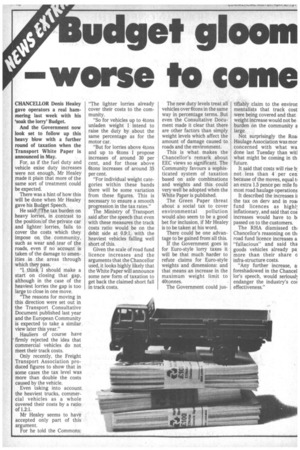udget gloom worse to come
Page 20

If you've noticed an error in this article please click here to report it so we can fix it.
CHANCELLOR Denis Healey gave operators a real hammering last week with his 'soak the lorry' Budget.
And the Government now look set to follow up this heavy blow with a further round of taxation when the Transport White Paper is announced in May.
For, as if the fuel duty and vehicle exise duty increases were not enough, Mr Healey made it plain that more of the same sort of treatment could be expected.
There was a hint of how this will be done when Mr Healey gave his Budget Speech.
He said:,"The tax burden on heavy lorries, in contrast to the position of the private car and lighter lorries, fails to cover the costs which they impose on the community, such as wear and tear of the roads, even if no account is taken of the damage to amenities in the areas through which they pass. • "1 think, should make a start on closing that" gap, although in the case of the heaviest lorries the gap is too large to close in one move.
"The reasons for moving in this direction were set out in the Transport Consultative Document published last year and the European Community is expected to take a similar view later this year."
Hauliers of course have 'firmly rejected the idea that commercial vehicles do not meet their track costs.
Only recently, the Freight Transport Association produced figures to show that in some cases the tax level was more than double the costs caused by the vehicle.
Even taking into account the heaviest trucks, commercial vehicles as a whole covered their costs by a ratio of 1.2:1.
Mr Healey seems to have accepted only part of this argument.
For he told the Commons: "The lighter lorries already cover their costs to the community.
"So for vehicles up to 4tons unladen weight I intend to raise the duty by about the same percentage as for the motor car.
"But for lorries above 4(ons and up to 6tons I propose increases of around 30 per cent, and for those above 6tons increases of around 3_5 per cent.
"For individual weight categories within these bands there will be some variation from these figures. This is necessary to ensure a smooth progression in the tax rates."
The .Ministry of Transport said after the speech that even with these measures the track costs ratio would be on the debit side at 0.9:1, with the heaviest vehicles falling well short of this.
Given the scale of road fund licence increases and the arguments that the Chancellor used, it looks highly likely that the White Paper will announce some new form of taxation to get back the claimed short fall in track costs. The new duty levels treat all • vehicles over 6tons in the same way in percentage terms. But even the Consultative Document made it clear that there are other factors than simply weight levels which affect the amount of damage caused to roads and the environment.
This is what makes the Chancellor's remark about EEC views so significant. The Community favours a sophisticated system of taxation based on axle combinations and weights and this could very well be adopted when the White Paper is published.
The Green Paper threat about a social tax to cover environmental pollution would also seem to be a good bet for inclusion, if Mr Healey is to be taken at his word.
There could be one advantage to be gained from all this.
If the Government goes in for Euro-style lorry taxes it will be that much harder to refute claims for Euro-style weights and dimensions: and that means an increase in the maximum weight limit to 40tonnes.
The Government could jus tifiably claim to the environ mentalists that track cost were being covered and that weight increase would not be burden on the community a large.
Not surprisingly the Row Haulage Association was mor concerned with what wa done last Tuesday than witl what might be coming in th, future.
It said that costs will rise 1): not less than 4 per cen because of the moves, equal t, an extra 1.5 pence pea' mile fo most road haulage operations It described the increases ii the tax on dery and in roal fund licences as high': inflationary, and said that cos increases would have to b passed on to the customers.
The RHA dismissed till Chancellor's reasoning on thi road fund licence increases a. "fallacious" and said tha goods vehicles already pa, more than their share infra-structure costs.
"Any further increase, a: foreshadowed in the Chancel lor's speech, would seriousl! endanger the industry's co effectiveness."




























































































